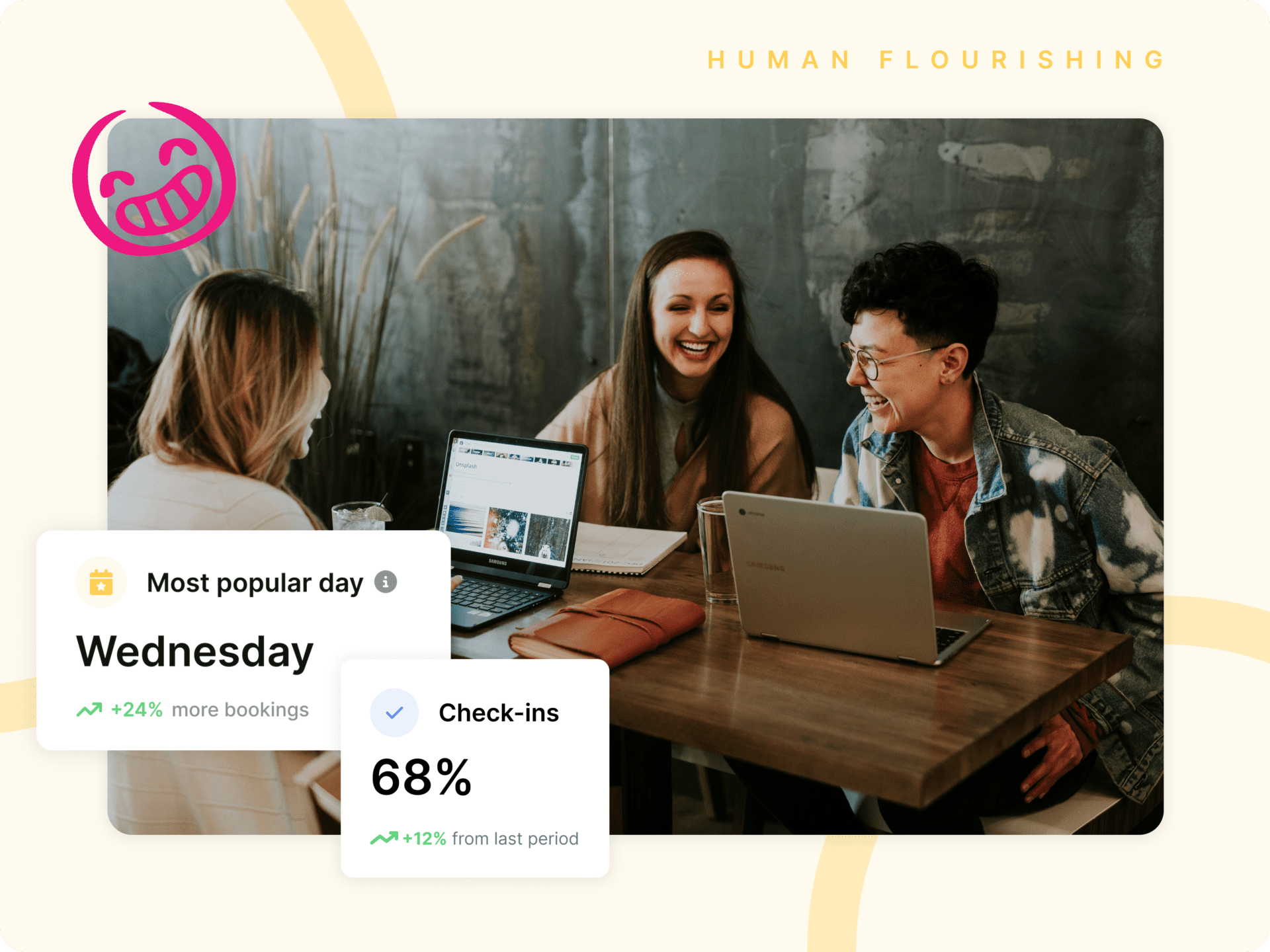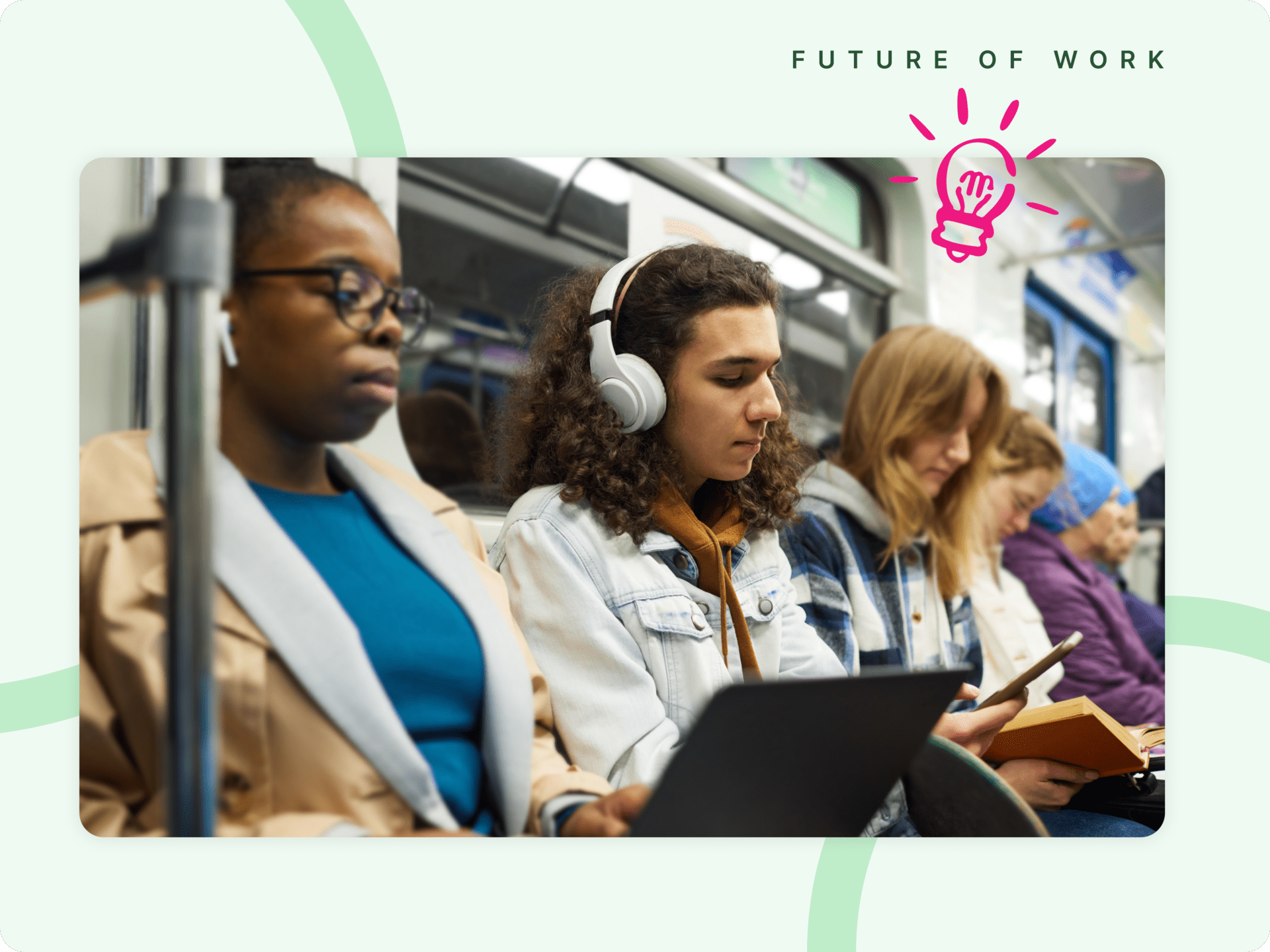How can your employees benefit from a hoteling office space?
Hoteling office space is the gold standard of flexible workplace setups, with employee experience taking centre stage. It gives people control over their time in the office, and provides space planners and facilities managers with a wealth of insight to plan and optimize people-centred workplaces.
And with 8 out of 10 generation Z’ers and millennials favoring flexible working, it’s the direction you’ll want to take if you’re going to retain your workforce of the future. Let’s run through exactly what it is, and the benefits it can bring to your company.
What is a hoteling office space?
Similar to booking a hotel room, hoteling office space requires employees to reserve a desk at their workplace in advance and to check in when they arrive. If a hotel room is designed to be a home from home, then a hoteling workspace is the office equivalent – a desk that your employees can use when they need to work away from home.
Employees don’t have a permanent desk. Instead, they book a hoteling desk for the times they come into the office. Fewer desks are needed, and the reservation and check-in system ensures that employees enjoy a seamless workplace experience.
Bookings are made and managed using desk hoteling software, such as Kadence. It differs from hot desking, where you allocate desks on a first-come, first-served basis. Hot desking is unpopular among many workers, because people don’t know where they’ll end up sitting when they come in, or who with. A hoteling workspace eliminates that drawback.
As a business, your number one asset is your people. So, what are the key benefits of office hoteling from an employee perspective?
Flexibility of how and where people want to work
People can work remotely when they want to, and when they need to come into the office, they book a space so they know that there’s a desk waiting for them in a location they’ve chosen. Office hoteling software such as Kadence means people can reserve whichever area in the office helps them do their best work – whether that’s in the thick of it with colleagues or tucked away in a quiet corner.
Improve space availability
Not knowing if they’ll be able to find a desk is a common worry for employees transitioning from a permanent desk arrangement to a more flexible setup.
Hoteling office space allays this concern on two fronts. First, choosing the right desk booking system means they’ll have visibility of what’s available, and can reserve in advance. Secondly, if a booked desk ends up not being used, you can release it back into the pool – improving desk availability across the workspace.
Increase employee engagement
An engaged team is a happy and productive one. People will take fewer sick days, work harder and are likely to stick around in their job for longer.
A study by Steelcase found a strong link between employee engagement and workplace satisfaction. What’s more, employees who had the most control over their workplace typically reported the highest levels of engagement. Office hoteling gives people that control and helps them meet basic needs of comfort and hygiene.
Many organizations are already investigating how to reduce touch points in their offices, but some are looking at different touchless technology that does not require physical touch – for example, employees can check-in and claim a desk with a touch of a button on their workplace app, without having to speak with anyone or touching any shared screens. With the basics taken care of, they can enjoy their workplace, build strong relationships with colleagues and fulfil their potential.
The software should also give space planners invaluable hyperlocal data that shows how often each desk is used, for how long and by whom to help monitor and enforce social distancing. Touchless check-in with a workplace app could also support contact tracing, which records who was using a given desk and who was sitting next to them.
It also gives employers the ability to craft a dynamic and agile workplace suited to the needs of their employees. Organizing your space into office neighborhoods is a great way to support this. Fewer desks means greater flexibility in layouts. If teams need access to printing equipment, meeting rooms or interactive whiteboards, you can design your office so they’ve got it nearby. Booking software gives you usage data to show you what’s working and what isn’t in your layout, so you can iterate and improve, and boost engagement.
Improve employee morale
The so-called 9-to-5 grind conjures up images of a dreary trudge into work on a packed train, or a stressed-out worker chained to a desk. Office hoteling helps employees break free, by enabling a hybrid workplace culture that redresses the work-life balance.
Because they’re not required in the office full-time, employees can enjoy less commuting, lower travel and lunch expenses, and the pleasure of working in their own home or favorite café.
And when they do need to come into the office, the right workplace technology will ensure that their experience is smooth and seamless. There’ll be no anxiety around whether or not they can find a desk or who they’ll be sitting with. An intuitive booking app lets them book, shows them the way to their desk, and has an overview of where colleagues are sitting.
You can factor in health and safety too. Because you’re able to ensure only cleaned desks are made available and seating plans comply with social distancing, you can help your employees feel safe in their work environment.
Better team collaboration
With fewer desks, you can reconfigure office spaces with collaboration in mind. Huddle spaces, more meeting rooms or activity-based neighborhoods that promote communication within a team. However your employees like to collaborate, you can facilitate it.
Just because people aren’t in the office all week, doesn’t mean regular collaboration can’t happen. Teams can book regular desk or collaboration space to maintain their cadence – whether it’s a planning session at the start of every week or a monthly project update meeting.
And finally, you can bring interdisciplinary teams together. Working on a project that involves different departments can mean trips to different floors or around campuses to speak to the people you need to. With office hoteling, a project team can reserve workspaces in certain neighborhoods for the duration of the project. The project’s manager, accountant, business development lead, and any other key team members could all work in the same space at a regular time each week.
Encourages office networking
The ability to book a desk anywhere in the office means people can mix up who they sit with, getting to know people they may not have met in a traditional office setup.
You’ll also be able to create more networking-friendly space, because you’ll have fewer desks to squeeze in. The usage data you get from the hoteling booking software shows you which areas are underutilized and could be put to better use for networking – as a breakout space or relaxation area, for example.
A final thought on the benefits of office space hoteling
The revolution in workplace culture has been brewing for some time, with digital native generation Z and millennials – who make up the largest cohort in the workforce – favoring the freedom to choose where and when they work.
The pandemic has forced us all to adapt to remote working. The next step for people-first employers is to create dynamic, technology-driven workplaces. Workplaces that empower employees and free them from the shackles of the daily commute and the traditional office desk or cubicle.
Office space hoteling managed using workspace booking software gives people control over where they work, and supports them to enjoy the benefits of a flexible workplace culture – improved morale, higher engagement, better collaboration, and greater networking opportunities.
Book a demo with one of our team today to see how Kadence’s desk booking software could help you create a people-first hybrid workplace.


